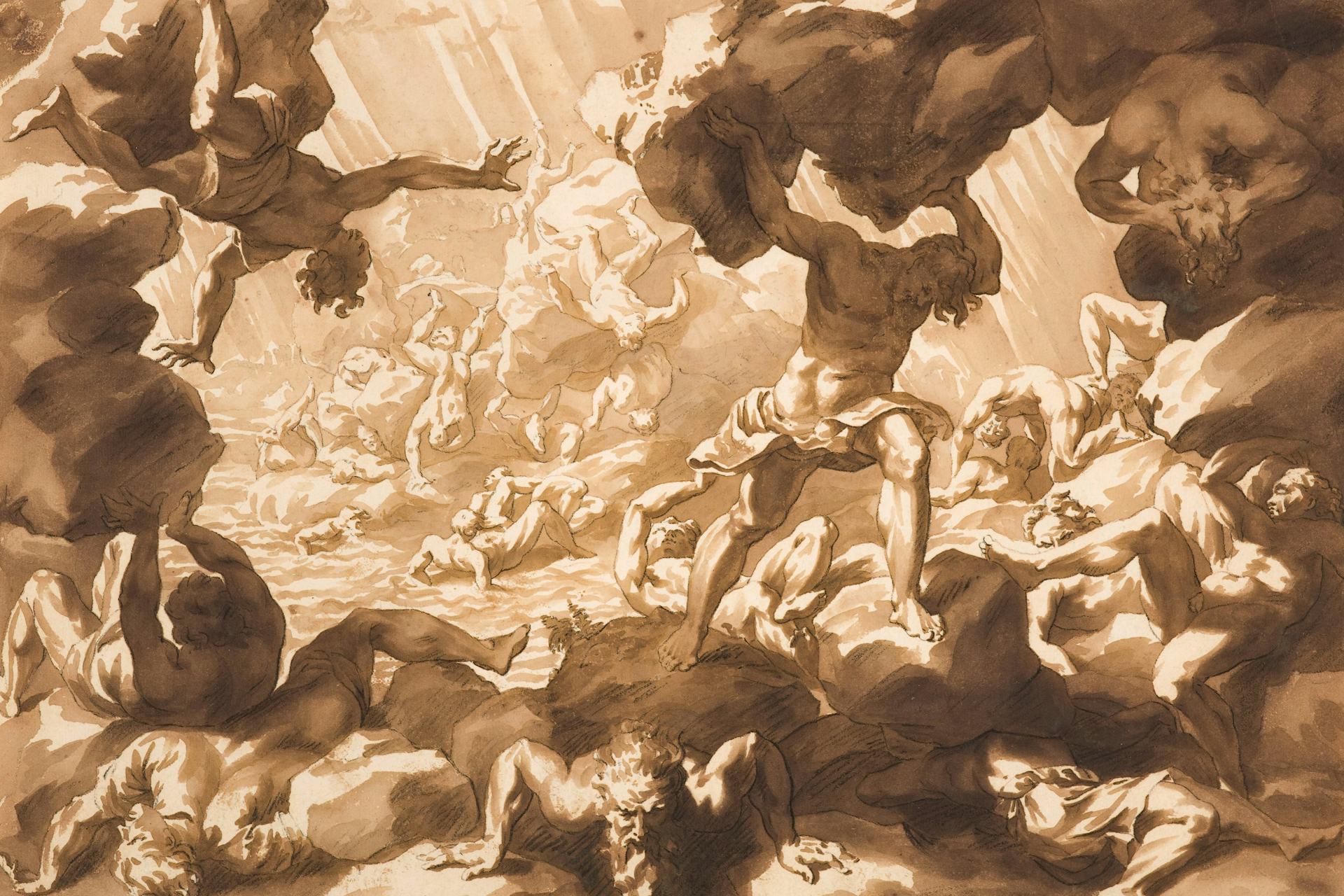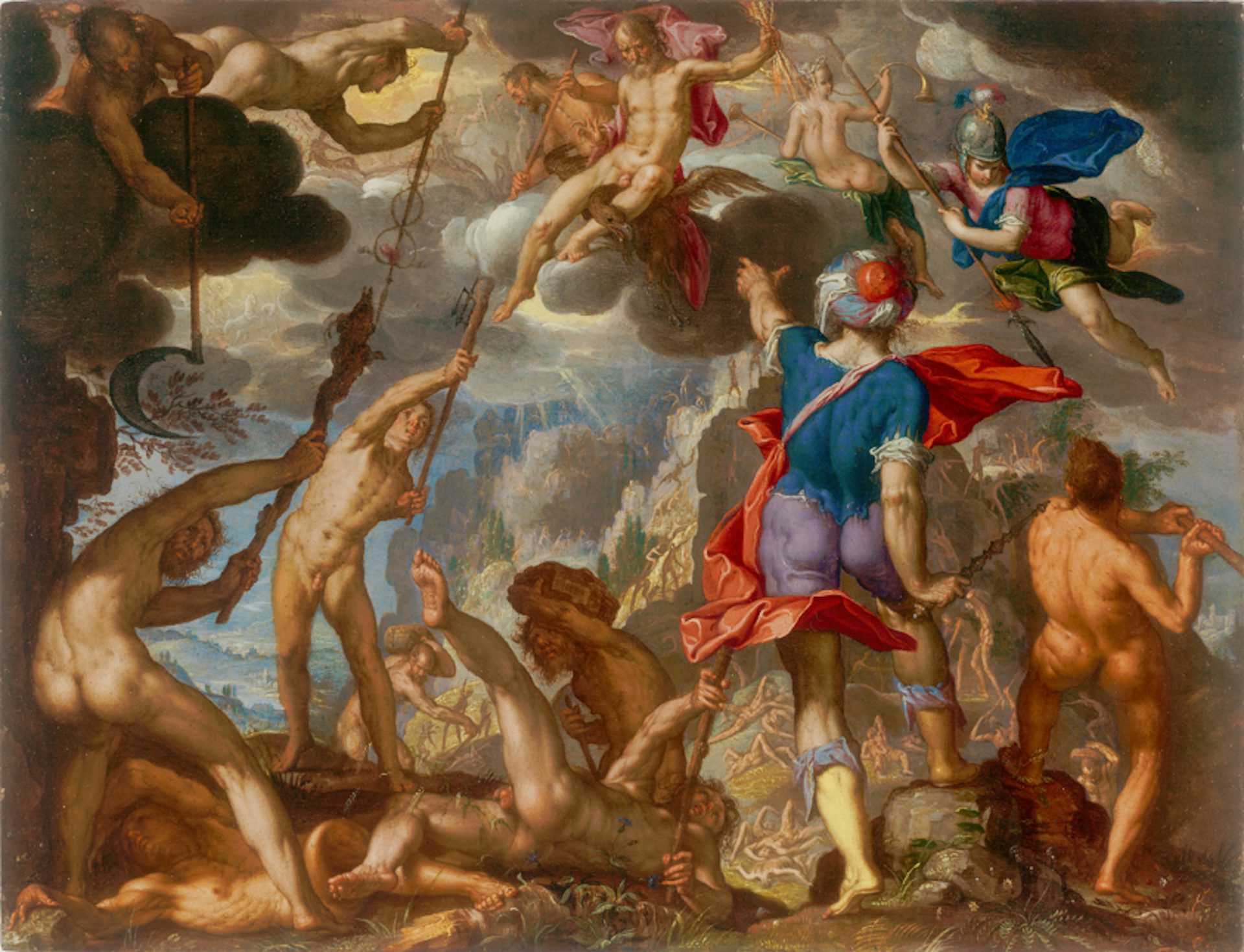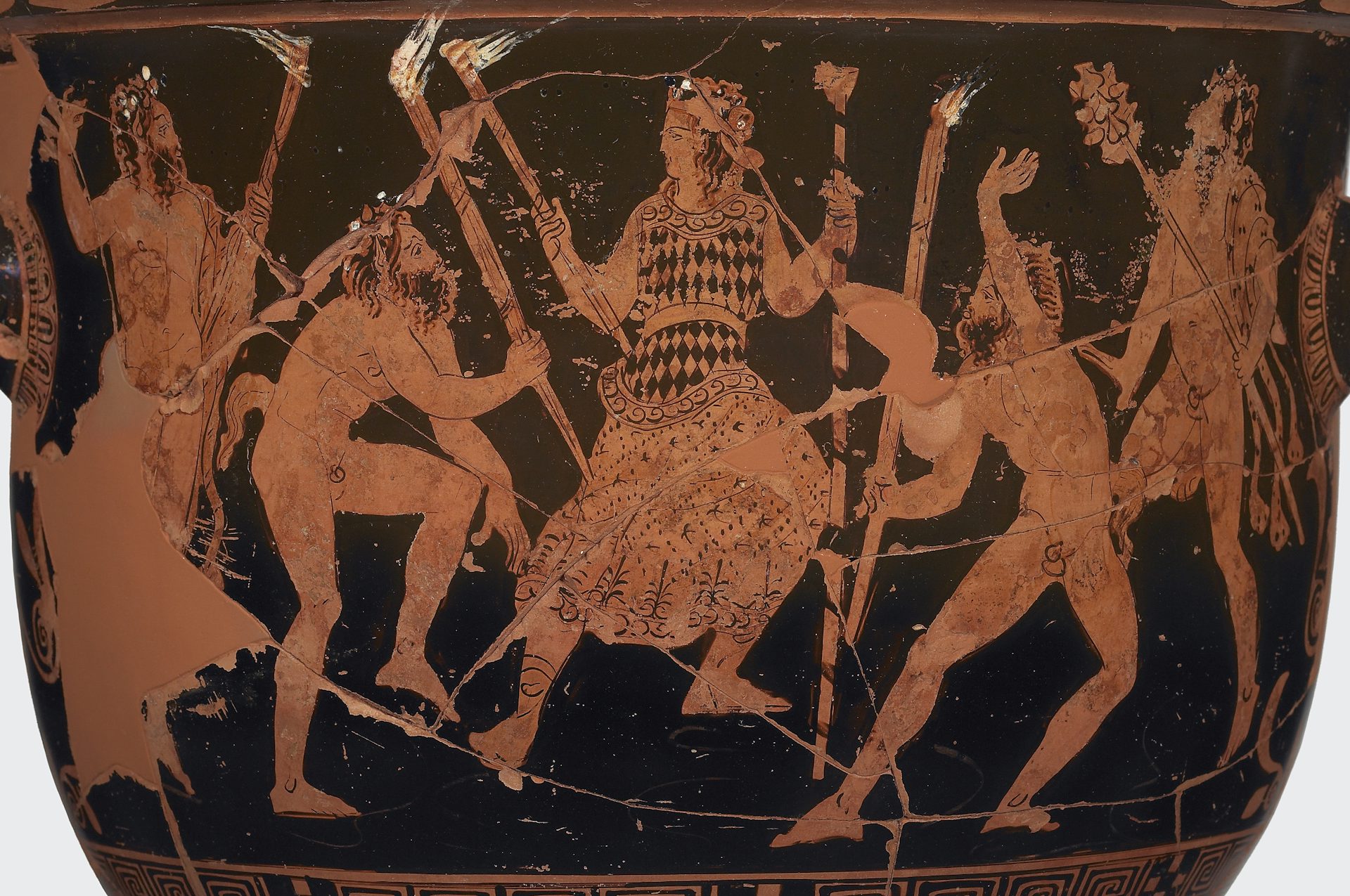Iapetus

Fall of the Titans by Jan de Bisschop, after Giulio Romano (1665).
NewfieldsPublic DomainOverview
Iapetus, son of Gaia and Uranus, was one of the original twelve Titans of Greek mythology. With his wife Clymene, he fathered several significant mythological figures, including Atlas, Prometheus, Epimetheus and Menoetius. After helping to overthrow his father Uranus, Iapetus fought against the Olympians in the Titanomachy. When the Titans were ultimately defeated, he was among those doomed to suffer for all eternity in the dark pit of Tartarus.

The Battle between the Gods and the Titans by Joachim Wtewael (ca. 1608).
Art Institute of ChicagoPublic DomainEtymology
The name Iapetus may be derived from the Greek word iaptein, meaning “to hurl” or “to wound.” This would make Iapetus “the one hurled down,” perhaps referring to his expulsion to Tartarus by Zeus and the Olympians.
Other scholars have argued that Iapetus’ name is pre-Greek in origin and can be traced to the biblical Japheth, the third son of Noah.[2] Indeed, both figures were believed to be progenitors of humanity: Japheth was often regarded as the ancestor of the inhabitants of Europe,[3] while Iapetus was the father of Prometheus, sometimes considered the creator of the human race.
Pronunciation
English
Greek
Iapetus Ἰαπετός (translit. Iapetós) Phonetic
IPA
[ahy-AP-i-tuhs, ee-AP-] / aɪˈæp ɪ təs, iˈæp-/
Attributes
Like most of the Titans, Iapetus was rarely individualized in ancient literature. Consequently, his precise attributes remain a mystery. However, Iapetus may have been associated with the attributes of his sons, such as the cleverness of Prometheus or the strength of Atlas, who held the heavens upon his shoulders.
Family
Iapetus was one of the twelve Titans who emerged from the primordial union of Gaia, the personification of the earth, and Uranus, the embodiment of the heavens. His brothers and sisters included not only the other Titans—Coeus, Crius, Hyperion, Thea, Rhea, Themis, Mnemosyne, Phoebe, Oceanus, Tethys, and Cronus—but also the monstrous Cyclopes and Hecatoncheires.[4]
According to the standard account (as told by Hesiod), Iapetus took Clymene, the daughter of Oceanus and Tethys, as his wife.[5] Other sources, however, assigned him different wives, including Asia[6] or Themis.[7]
Family Tree
Mythology
According to Hesiod’s Theogony, Iapetus was the son of Gaia and Uranus. He took Clymene (an Oceanid) as his lover, and they had many children:
Now Iapetus took to wife the neat-ankled ma[i]d Clymene, daughter of Ocean, and went up with her into one bed. And she bare him a stout-hearted son, Atlas: also she bare very glorious Menoetius and clever Prometheus, full of various wiles, and scatter-brained Epimetheus who from the first was a mischief to men who eat bread.[12]
Iapetus was loyal to his brother Cronus, the leader of the Titans; when Cronus rose up against their father Uranus, Iapetus helped hold Uranus down while Cronus severed his genitals with a scythe. Later, Iapetus fought alongside Cronus during the Titanomachy, the ten-year war between the Titans and Zeus’ Olympians. This war split Iapetus’ family down the middle: while two of his sons, Atlas and Menoetius, fought with him on the side of the Titans, the other two, Prometheus and Epimetheus, sided with the Olympians.
When Zeus finally emerged victorious, he punished the Titans severely, rounding them up and casting them into the hellish pit of Tartarus—Iapetus included. In some traditions, however, Iapetus was actually buried under the island of Inarime.[13]
Iapetus and the other Titans were usually thought to have been imprisoned for all eternity. There was, however, another version in which Zeus was merciful and eventually released the Titans (all except Iapetus’ son Atlas, who was still forced to hold up the sky).[14]
In Greek and Roman literature, Iapetus was most often named in connection with his more famous sons. Prometheus, for example, was sometimes referred to as the “son of Iapetus.” In Hesiod’s Works and Days, Zeus uses this epithet to address Prometheus following his theft of fire: “Son of Iapetus, surpassing all in cunning, you are glad that you have outwitted me and stolen fire—a great plague to you yourself and to men that shall be.”[15]

Iapetus' son Prometheus the Fire-Lighter, as depicted on this bell krater vessel (ca. 400 BCE).
Yale University Art GalleryPublic DomainNot much else is known about Iapetus; as such, it is difficult to determine what the title “son of Iapetus” may have meant to the ancient Greeks (beyond a simple expression of lineage).
Worship
Iapetus was almost never worshipped in cult, but there is one inscription suggesting that he received some sort of religious honors on the island of Imbros.[16]
Pop Culture
Iapetus appears as a villain—and later a hero—in Rick Riordan’s Heroes of Olympus book series. The transformation occurs after the ignoble Iapetus is cast into the River Lethe, which absorbs memories. With his evil forgotten, Iapetus emerges as a heroic figure named Bob who assists the Olympians in defeating the giants.
Iapetus also lent his name to Saturn’s third largest moon. Discovered in 1671 by Italian astronomer Giovanni Domenico Cassini, the moon was named in the mid-nineteenth century at the suggestion of John Herschel.

Iapetus, shown here, is Saturn's 3rd largest moon and known for its hemispheres of extreme contrasts of brightness and darkness. Saturn's largest moon is named Titan and is larger than the planet Mercury.
NASAPublic Domain